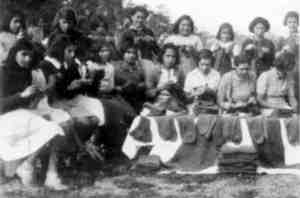The war had a great effect on the place of indigenous people in Australia. Large numbers of men and women joined the services or worked in war industries - and received greater training, pay and social contacts than many had had before. As Oodgeroo Noonucal, the poet and political activist and signaller in the AWAS said, 'There was a job to be done ... all of a sudden the colour line disappeared.' For many non-indigenous Australians this was their first real contact with Aboriginal Australians.

Women at Cummerajunga Mission knitting for the war
Many indigenous people also had contact with black American troops in Australia, and saw them with skills, money and a greater sense of civil rights.
To investigate this aspect of the Home Front experience by using evidence from the time, see Home Fronts at War, Ryebuck Media for ANZAC Day Commemoration Committee of Queensland.
More about the book HOME FRONTS AT WAR





